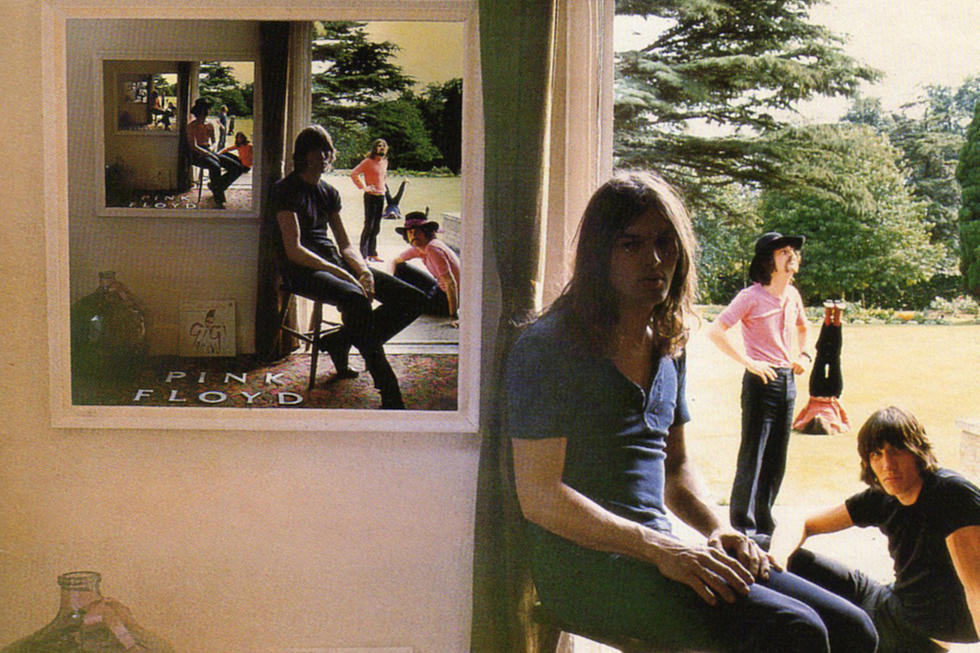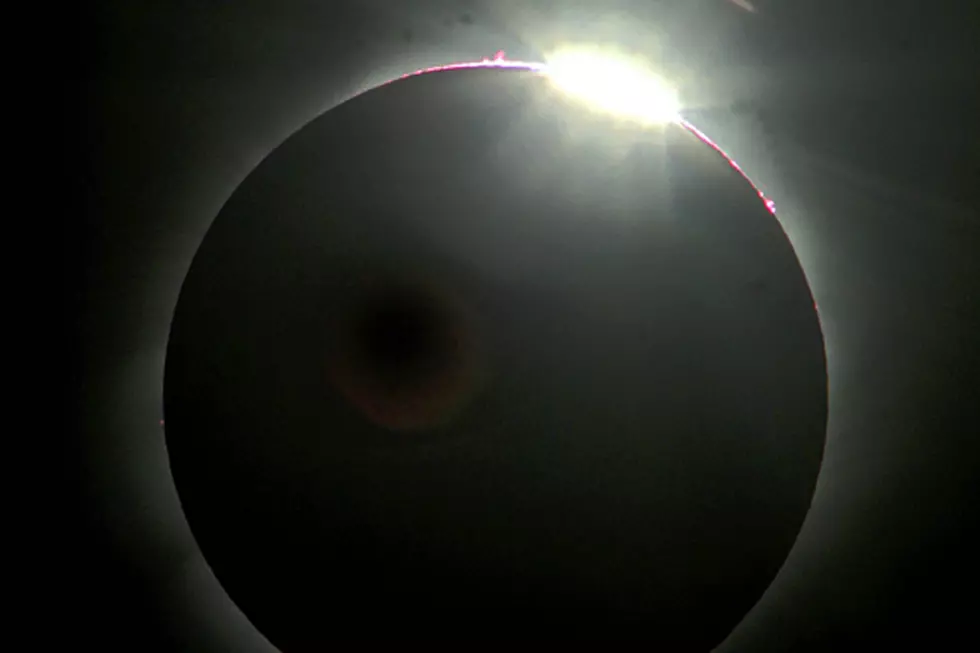
Why Pink Floyd Still Hadn’t Found Their Direction on ‘Ummagumma’
Ummagumma found Pink Floyd still searching for direction after the departure of original frontman Syd Barrett. Released on Oct. 25, 1969, the LP was split evenly between live interpretations of older music, and new music governed by strange, sometimes directionless experiments.
"We were fairly brave, and would put anything on a record that amused us one way or another," replacement David Gilmour admitted to Rolling Stone in 2011. "But in some of those moments we were floundering about, and didn't have our forward momentum very clear, and inspiration might have been a bit thin on the ground at times."
Ummagumma nevertheless became Pink Floyd's best-selling album in both America and the U.K. to that point, finishing at an impressive No. 5 in their home country – though stalling at No. 74 stateside. And, after an experiment with big-band arrangements on Atom Heart Mother, this period ultimately helped shape the band's vision for larger successes into the '70s.
“I think what we ended up doing in a way, was going down some cul-de-sacs,” Nick Mason said in a 2014 interview. “I think Atom Heart Mother, which we’re all fond of – we think it’s interesting – it was not the route we ended up continuing down, in the same way that Ummagumma wasn’t either.”
There's no denying the gumption on the original material for Ummagumma, which gave each of the four members – Richard Wright, Roger Waters, Gilmour and then Mason – an opportunity to create a solo piece, without the involvement of the others. In the end, however, this was a road Pink Floyd decided was better left untraveled. "The idea of everyone operating separately didn’t work particularly well," Mason added. "It was really [1971's] Meddle that was the next stepping stone, and the way forward towards Dark Side [of the Moon]."
They began with a 13-and-a-half minute Wright composition titled "Sysyphus, Parts 1-4," a remarkable epic that moves from ominous orchestral wonder to contemplative piano and then onward into free-form noise. All of it combines to make a case for the often-overlooked keyboardist as a musical visionary in his own right. "It's always been the fight between me and Roger," Gilmour told Rolling Stone. "So, Rick gets forgotten about a little bit. He hasn't got quite the credit he should have."
Unfortunately, Ummagumma arrived as Pink Floyd reached their unfocused, do-anything zenith, and rarely lives up to that promise again. "Grantchester Meadows," the first of two consecutive Waters songs, is more pastoral than interesting. It melds directly into the humorously named "Several Species of Small Furry Animals Gathered Together in a Cave and Grooving with a Pict." Still lost in a bucolic, strangely detached world, Waters creates the woodland creatures' sounds by speeding up tape of his own voice, and leaves an easter egg for historical types by referencing the ancient co-founders of Scotland. But, really, the only thing worth mentioning – after its fantastical title – is an impish backwards-masked message toward the end which says, "That was pretty avant-garde, wasn't it?"
Gilmour's "The Narrow Way, Parts 1-3" indulges in some of the weird studio gimmickry and out-there glissandos that helped solidify Pink Floyd's position among so-called space rockers – an idea underscored elsewhere with songs like "Set the Controls for the Heart of the Sun" and, later, with the Dark Side of the Moon project.
"The space thing was a joke," Waters countered, in Rolling Stone. "None of those pieces were about outer space. They were about inner space. That's all it's ever been about – human beings and their insides, whether it was Syd's writing or mine. They were both about the same thing."
Listen to Pink Floyd Perform 'Careful With That Axe, Eugene'
Finally, there's Mason's "The Grand Vizier's Garden Party," a rare compositional contribution from the drummer wherein he endlessly processes an assortment of percussion elements. These type of wanderings would eventually reach their oddball peak in 1970's simply outrageous "Alan's Psychedelic Breakfast," which was dotted with the sounds of a roadie actually making a morning meal. "Seamus," from 1971, featured a friend's dog howling.
By then, however, Pink Floyd had created the career-shifting, consistently imaginative "Echoes," a sweeping composition that pointed the way out of this period's restless trial and error. "Moving on from our 'Psychedelic Breakfast' moments – which is great in its way, but I'd never want to listen to it, really – to something more concrete like 'Echoes' was much more satisfying," Gilmour told Rolling Stone.
Meanwhile, Ummagumma's concert reinterpretations from the spring of 1969 – valuable in that they capture the group in its earliest stages of meshing with David Gilmour in the post-Barrett age – begin appropriately enough with Barrett's "Astronomy Domine." His absence, after all, served as impetus for the unsettled period that followed.
"It was an open page," Gilmour said of his first days with Pink Floyd, in a 1987 talk with Rolling Stone. "My initial ambition was just to get the band into some sort of shape. It seems ridiculous now, but I thought the band was awfully bad at the time when I joined. The gigs I'd seen with Syd were incredibly undisciplined. The leader figure was falling apart, and so was the band."
Pink Floyd also offers a daring version of "Careful With That Axe, Eugene," then a concert favorite that had only been available previously as a b-side. They take a more leisurely stroll through Waters' "Set the Controls," before unleashing a stunning, nearly 13-minute examination of the title track from 1968's A Saucerful of Secrets. Inside of both you hear the first stirrings of an interlocking collaborative relationship that would power "Echoes," which would then lead to Dark Side -- and superstardom.
Ironically, Pink Floyd had to take a look back in order to go forward. "'Echoes' was the closest precursor in terms of construction and the musicality of [Dark Side of the Moon]," Waters later told Rolling Stone, before adding: "The other thing that I'd point to is A Saucerful of Secrets, which in a musical sense was similar. It had a number of movements, it had a fast bit and a slow bit."
After another album dotted with individual attempts at musicmaking, Pink Floyd emerged from this era determined to work together – and, in so doing, found their greatest successes. But Ummagumma and then Atom Heart Mother simply had to come first, as the group struggled past the loss of Barrett.
"People accuse us of being pretentious, but if you don’t push the boundaries, if you don’t verge on the borders of being pretentious, I don’t think you advance an awful lot," Gilmour added. "You’ve got to have courage and not care what people think about you at that moment."
Top 50 Progressive Rock Albums
When Alice Cooper Got Stoned with Pink Floyd
More From Ultimate Classic Rock









